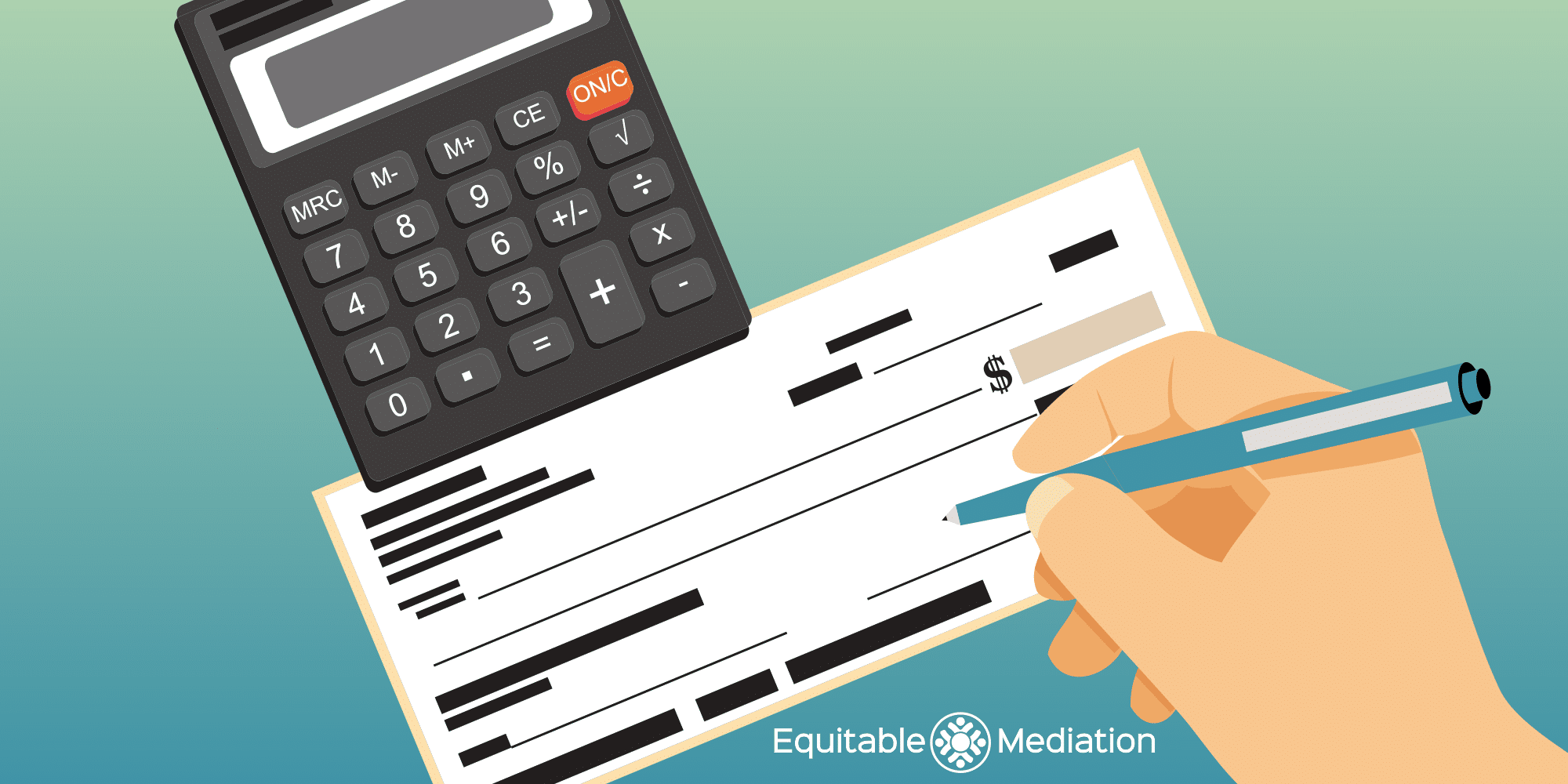As a parent getting a New York divorce, your children are bound to be your number one concern. And they should be. You love your kids and want the world for them. So now that you’re facing divorce, how do you make sure they get the financial support they need to live healthy and happy lives?
That’s where child support comes in.
But there’s a lot more to child support in New York than you might think.
What is the purpose of child support? And how is child support calculated in NY?
You might think the purpose of child support is to ensure that the financial needs of your children are being met by you and your soon-to-be ex-spouse.
But it’s important to understand that child support is about more than just money.
While it’s true that child support is designed to ensure your children’s financial well-being, that’s only half of it. Divorce is hard on your children. And the conflict and stress can take a toll on them. Soon you’ll no longer be husband and wife, but you’ll always be mom and dad.
Child support also shows your kids you still love them and care about their well-being, too.
There are a few things you need to know about the challenges of determining child support in NY state:
- While there is a child support guideline, it’s not as comprehensive as it should be, it doesn’t include all the expenses required to raise a child, and it isn’t applicable in all situations.
- Over the past two years, parents in New York have seen the consumer price index rise 14%, making the cost of raising children, in an already high cost-of-living area, even that much more difficult.
- With mortgage interest rates continuing to remain unaffordable for most divorcing couples, combined with New York’s notoriously high real estate prices and property taxes, establishing two separate post-divorce households may require “creative financial cooperation” between divorcing parents.
- This topic has less to do with family law and more to do with money, negotiation, and doing what’s best for your kids.
- There is more than meets the eye on this issue and in the majority of cases, this subject is much too complex for you to try to resolve on your own.
That’s why you will get the best result by mediating with us.
The child support guideline in New York is not as comprehensive as it should be.
The federal government requires all 50 states to have a systematic way by which to determine a basic child support obligation. So every state including New York has a child support guideline. But the way child support is determined varies from state to state.
Some states use a simple percentage-based formula. You’d simply take a share of the supporting party’s income and give it to the other party and you’re done. While other states are more comprehensive and attempt to factor in things like both of your incomes, the ages of your children, the number of overnights they spend with each of you, which one of you pays for their health insurance, who takes them as a tax deduction, and more.
But in New York, things work a bit differently.
Determining child support in New York is a very tricky proposition.
Let’s take a closer look at how child support is calculated in New York as the NY child support model doesn’t fit cleanly into either of the models described above. To begin, the guideline would calculate what each of your net incomes is. Well, it’s not really your net income, but rather, what the State of New York calls your net income.
I’m no CPA or accounting professional mind you, but the state of New York’s definition of net income doesn’t reduce your gross income by Federal taxes paid. Which last time I checked, that’s how most people do it… But not NY, I guess?
So once you have all that net income business all figured out, you now apply a percentage to the number you came up with in step one based on the number of children you’re trying to provide child support for.
The New York child support calculator percentages are as follows:
- 17% for one child;
- 25% for two children;
- 29% for three children;
- 31% for four children; and
- No less than 35% for five or more children.
Assuming you can do some basic math, it seems that all you’d have to do is multiply the percentage in the table above with the net income number you came up with in step one and you’d be all set.
Right? I hate to break it to you, but it’s not that simple. Not even close. You see, the percentages shown above are only applied to the first $183,000 of combined net income (that is net income as defined by the State of New York’s standard in 2024) as that’s what the cap on the guideline says to do.
So what do you do if your incomes are above $183,000?” Well, that’s where things get even trickier.
Dealing with the NY child support cap
If you and your spouse do earn more than $183,000 per year in “net” income, one of two things could happen if you were to find yourselves in court.
The courts could either:
- Use the formula we discussed above, applying the same percentage to your incomes that exceed $183,000 as was applied to your income that was below $183,000;
- Use their own formula and randomly decide how much additional child support there will be; or
- Not award any additional child support.
It’s truly anybody’s guess.
Whether or not there will be additional child support will be predicated on the following factors:
- How much money you and your spouse have as well as how much money your children have;
- Your children’s health from both a physical and emotional standpoint;
- If your children have any special needs or show any special abilities that may require additional financial support;
- What your children’s lives would have looked like were you and your spouse not to divorce;
- The taxes you each pay;
- Other contributions that are not financial in nature that each of you will make to your children;
- If either of you wants to go to school and further your education;
- If there’s a large disparity in your incomes; and
- If there are any other children from a previous relationship that either of you is supporting.
You’ll notice most of these factors aren’t even financial in nature so how the courts will apply them is a mystery.
A lot is left out of the NYS child support guidelines.
So far, you’ve learned the NY child support guidelines attempt to provide you with an amount of financial support needed to raise your children.
But even when you run the guidelines and go through all the steps mentioned above, there are still many other expenses that aren’t included in the basic child support amount.
In New York, there’s also something called “add-on child support.” This is in addition to your regular child support and child support on any income above the upper-income threshold.
These add-on expenses may include:
- Child care costs;
- Medical insurance premiums;
- Unreimbursed medical expenses; and
- Educational expenses; and
- Non-recurring payments from extraordinary sources.
What the heck are non-recurring payments from extraordinary sources?
Good question! Non-recurring payments from extraordinary sources are expenses that you as parents incur but don’t fall neatly into any of the expenses explicitly mentioned above. Examples of non-recurring payments from extraordinary sources may include:
- Guitar lessons;
- Gymnastics;
- Sleepaway camps;
- Tablets and smartphones;
- Prom dresses and tuxedos;
- Auto insurance;
- And lots more!
All of these items must be negotiated at the time of your divorce as there is no formulaic way to determine them.
Starting to see why determining child support is not as simple as using some free calculator you may have found on the Internet?
There are other exclusions to child support in New York.
In addition to the regular and add-on expenses associated with having a child, you and your spouse will also need to discuss and come to an agreement on:
- Who deducts the children on their taxes;
- Whether you have enough life insurance to cover the children’s expenses now and when they go off to college;
- How college will be paid for;
- The duration of child support payments in New York (because for some children, it may extend beyond the normal age of emancipation.)
Making the list of what isn’t addressed by the NY child support guidelines longer and longer!
The New York child support guidelines aren’t applicable in all situations.
For the NY child support guideline to be applied as-is, you and your spouse’s incomes must be predictable from month to month and year to year. So if one or both of you earn more of your compensation from bonuses, commissions, or stock options, the guidelines simply won’t work.
And as you learned, there’s an income cap of $183,000 in the 2024 guidelines.
Meaning if you and your spouse collectively earn more than that in a calendar year (and to live in New York City, chances are you do,) the guidelines won’t work “as-is.”
And you’ll have no choice in your case but to skip the guidelines and negotiate instead.
Which is not always so easy to do.
When the law gets involved, it’s a problem.
There’s something you need to understand here: In a litigated divorce, a judge determines child support payment in family court.
Sounds scary, doesn’t it?
Because they’ll dictate child support by court order and both spouses might wind up with something they don’t think is fair or that doesn’t appropriately meet the needs of their children.
That’s why it’s better to negotiate this issue out of family court and that’s exactly what mediation is all about.
In mediation, you get to decide as parents – and come to an agreement that puts your children first and you both agree is fair – out of New York court – instead of letting your future be decided by a stranger.
You’ll get the best child support result by mediating with us.
Child support issues will vary based on your situation and circumstances of your case. And as you’ve learned, there is more than meets the eye on this topic. So don’t risk putting your children’s financial future in jeopardy by trying to resolve child support payments on your own or with divorce attorneys in court.
Use divorce mediation and work with us instead!
Using our extensive financial expertise, we’ll help you and your spouse determine a child support number that accurately reflects your lives as parents and takes into account the specialized needs of your children.
One that covers all regular, add-on, and future expenses.
We’ll:
- Talk about who your children are, what they like to do, and what it will take to make sure they’re getting what they need and deserve. Not just what the formula says you have to pay so they can “get by.”
- Work through specialized cases like child support in which you share in the care of your children equally or almost equally because the time the children spend with each of you isn’t explicitly factored into the New York child support guideline.
- Help you negotiate any issues of disagreement and create an agreement you both find fair and equitable as parents regarding the support of your children.
- Make sure you and your spouse not only come to an agreement that you both find to be fair, but also one that minimizes tax issues, avoids penalties, and improves cash flow whenever possible in your case.
Because no two situations are alike.
Your children are unique and your child support agreement should reflect that, too.
Guide to Divorce Mediation in NYC
Why Trust Equitable Mediation
Equitable Mediation Services is a trusted and nationally recognized provider of divorce mediation, serving couples exclusively in California, New Jersey, Washington, New York, Illinois, and Pennsylvania. Founded in 2008, this husband-and-wife team has successfully guided over 1,000 couples through the complex divorce process, helping them reach amicable, fair, and thorough agreements that balance each party’s interests and prioritize their children’s well-being. All without involving attorneys if they so choose.
At the heart of Equitable Mediation are Joe Dillon, MBA, and Cheryl Dillon, CPC—two compassionate, experienced professionals committed to helping couples resolve the financial, emotional, and practical issues of divorce peacefully and with dignity.
Joe Dillon, MBA – Divorce Mediator & Financial Expert
As a seasoned Divorce Mediator with an MBA in Finance, Joe Dillon specializes in helping clients navigate complex parental and financial issues, including:
- Physical and legal custody
- Spousal support (alimony) and child support
- Equitable distribution and community property division
- Business ownership
- Retirement accounts, stock options, and RSUs
Joe’s unique blend of financial acumen, mediation expertise, and personal insight enables him to skillfully guide couples through complex divorce negotiations, reaching fair agreements that safeguard the family’s emotional and financial well-being.
He brings clarity and structure to even the most challenging negotiations, ensuring both parties feel heard, supported, and in control of their outcome. This approach has earned him a reputation as one of the most trusted names in alternative dispute resolution.
Cheryl Dillon, CPC – Certified Divorce Coach & Client Advocate
Cheryl Dillon is a Certified Professional Coach (CPC) and the Divorce Coach at Equitable Mediation. She earned a bachelor’s degree in psychology and completed formal training at The Institute for Professional Excellence in Coaching (iPEC) – an internationally recognized leader in the field of coaching education.
Her unique blend of emotional intelligence, coaching expertise, and personal insight enables her to guide individuals through the emotional complexities of divorce compassionately.
Cheryl’s approach fosters improved communication, reduced conflict, and better decision-making, equipping clients to manage the challenges of divorce effectively. Emotions have a profound impact on shaping the divorce process, its outcomes, and the future well-being of all involved.
What We Offer: Flat-Fee, Full-Service Divorce Mediation
Equitable Mediation provides:
- Full-service divorce mediation with real financial expertise
- Convenient, online sessions via Zoom
- Unlimited sessions for one customized flat fee (no hourly billing surprises)
- Child custody and parenting plan negotiation
- Spousal support and asset division mediation
- Divorce coaching and emotional support
- Free and paid educational courses on the divorce process
Whether clients are facing financial complexities, looking to safeguard their children’s futures, or trying to protect everything they’ve worked hard to build, Equitable Mediation has the expertise to guide them towards the outcomes that matter most to them and their families.
Why Couples Choose Equitable Mediation
- 98% case resolution rate
- Trusted by over 1,000 families since 2008
- Subject-matter experts in the states in which they practice
- Known for confidential, respectful, and cost-effective processes
- Recommendations by therapists, financial planners, and former clients
Equitable Mediation Services operates in:
- California: San Francisco, San Diego, Los Angeles
- New Jersey: Bridgewater, Morristown, Short Hills
- Washington: Seattle, Bellevue, Kirkland
- New York: NYC, Long Island
- Illinois: Chicago, North Shore
- Pennsylvania: Philadelphia, Bucks County, Montgomery County, Pittsburgh, Allegheny County
Schedule a Free Discovery Call to learn if you’re a good candidate for divorce mediation with Joe and Cheryl.




